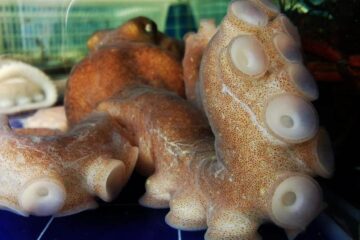Burying Crop Residues at Sea May Help Reduce Global Warming

It involves gathering billions of tons of cornstalks, wheat straw, and other crop residue from farm fields, bailing it, shipping the material to seaports, and then burying it in the deep ocean.
Scientists in Washington and California have concluded that this Crop Residue Oceanic Permanent Sequestration (CROPS) approach is the only practical method now available for permanently sequestering, or isolating, the enormous quantities of CO2 necessary to have a real impact on global warming.
In a report scheduled for the Feb. 15 issue of ACS’ Environmental Science & Technology, a semi-monthly journal, Stuart Strand and Gregory Benford conclude that (CROPS) could reduce global carbon dioxide accumulation by up to 15 percent per year. Plants remove carbon dioxide from the atmosphere during photosynthesis, and release it when they decay. Ocean burial would prevent that carbon dioxide from re-entering the atmosphere.
After comparing known methods for carbon dioxide sequestration on the basis of efficiency, long-term effectiveness, practicality, and cost, the researchers concluded that CROPS is the only method feasible with existing technology. CROPS would be 92 percent efficient in sequestering crop residue carbon. They recommend that crop residue sequestration and its effects on the ocean should be investigated further and its implementation encouraged.
ARTICLE #3
“Ocean Sequestration of Crop Residue Carbon: Recycling Fossil Fuel Carbon Back to Deep Sediments”
DOWNLOAD FULL TEXT ARTICLE: http://pubs.acs.org/stoken/presspac/presspac/full/10.1021/es8015556
CONTACT:
Stuart E. Strand, Ph.D.
University of Washington
Seattle, Washington 98195
Phone: 206-543-5350
Fax: 206-685-3836
Email: sstrand@u.washington.edu
Media Contact
More Information:
http://www.acs.orgAll latest news from the category: Ecology, The Environment and Conservation
This complex theme deals primarily with interactions between organisms and the environmental factors that impact them, but to a greater extent between individual inanimate environmental factors.
innovations-report offers informative reports and articles on topics such as climate protection, landscape conservation, ecological systems, wildlife and nature parks and ecosystem efficiency and balance.
Newest articles

Technical Trials for Easing the (Cosmological) Tension
A new study sorts through models attempting to solve one of the major challenges of contemporary cosmic science, the measurement of its expansion. Thanks to the dizzying growth of cosmic…

Peptides on Interstellar Ice
A research team led by Dr Serge Krasnokutski from the Astrophysics Laboratory at the Max Planck Institute for Astronomy at the University of Jena had already demonstrated that simple peptides…

Octopus inspires new suction mechanism for robots
A new robotic suction cup which can grasp rough, curved and heavy stone, has been developed by scientists at the University of Bristol. The team, based at Bristol Robotics Laboratory,…





















